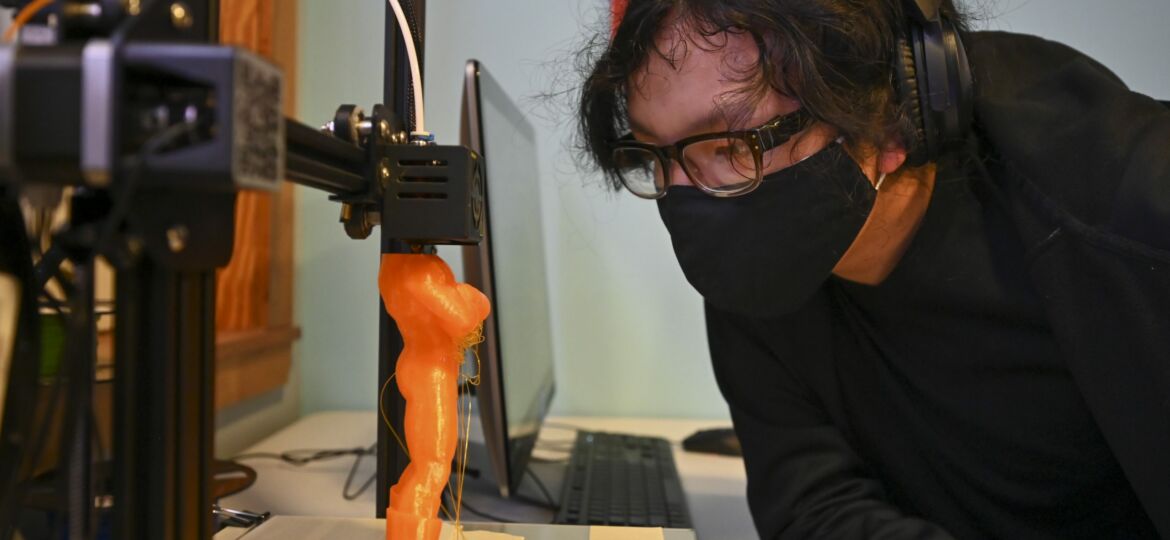When an adult enters a Best Buy Teen Tech Center, it might feel unstructured, maybe even a bit chaotic. But that’s entirely by design.
No one provides specific assignments or instructions like in a standard classroom. Rather, the teens are free to engage with the latest technology, like drawing tablets, robots, 3D printers and even a state-of-the-art music production studio.
The result is powerful. Teen Tech Centers aren’t just places where teens can access tech, but rather they serve as a foundation for community and self-discovery.
That learning model was developed by longtime Best Buy partner The Clubhouse Network, a nonprofit that provides creative and safe out-of-school learning environments for young people from disinvested communities. It’s a unique and engaging approach that enables youth to creatively discover, experiment and explore.
“It’s the secret sauce of the Teen Tech Center design,” said Gail Breslow, Clubhouse Network’s executive director. “The organic space with endless possibilities invites and empowers young people to tap into their own interests and feel the support of their peers and adults who help guide them.”
The approach was born more than 30 years ago at The Computer Museum (now part of the Museum of Science in Boston) through a collaboration with the MIT Media Lab and its Lifelong Kindergarten group. Together, the organizations wanted to create something unlike a typical technology or computer lab. They envisioned a space where youth would learn through play alongside peers and mentors in an environment that fosters trust and respect.
That space quickly increased in popularity among youth and outside organizations that wanted to get involved. That sparked the creation and expansion of The Clubhouse Network, which has developed into a global community that provides resources for youth at more than 100 locations (including 35 Best Buy Teen Tech Centers).
Learning to ‘fail forward’
The learning model used by our Best Buy Teen Tech Centers guides everything from the programming to the design of the physical space. The model focuses on four key tenants:
- Projects: Encouraging young makers and doers to ideate, create, and iterate
- Passions: Providing opportunity for teens to work on projects that they care deeply about
- Peers: Fostering creativity through collaborative, peer-to-peer learning
- Play: Supporting risk-taking and celebrating failure as part of the process
This learning approach invites youth to step outside their comfort zones, figure out what may or may not work, and celebrate learnings that come from trial and error — or “failing forward,” as they say at the Teen Tech Centers.
“Rather than being spoon-fed with instructions and strict curriculum, youth learn skills of taking initiative, teamwork, creative problem-solving and taking a project from an idea to fruition,” Gail said.
The approach grounds itself in the fields of education, developmental and school psychology, cognitive science, and youth development. It builds on research around the role of motivation in the learning process and the value of social interactions
It leverages new technologies to support a variety of learning experiences, and it aims to engage young people that may not learn best from traditional educational approaches.
Transforming tech consumers into tech creators
Here’s a closer look at other elements that help make Teen Tech Centers such an engaging and impactful experience for youth.
Tech-powered engagement
Each Teen Tech Center has state-of-the art technology that helps level the playing field for teens who otherwise might have restricted, limited or sometimes nonexistent access to technology. The professional-grade tech, much of which is provided in-kind by Best Buy partner companies, lets teens make, create and innovate while also learning key tech skills that can be used in school, careers and beyond.
A community-focused experience
Supportive mentors inspire new passions and possibilities. The exploration-oriented relationship among peers and mentors builds mutual trust and respect, encouraging youth to continue to play and fail hands-on and celebrate the entire experience.
Preparation for the future
In addition to allowing for exploration, Teen Tech Centers provide 21st century skills training to older teens interested in applying their interests in STEAM to future career endeavors. For example, relationships with Best Buy vendor partners provide opportunities for teens to apply their skills to real-world projects and engage in paid internships.
Best Buy recently committed $44 million toward inclusion, diversity and community efforts. The five-year plan includes a plan to build a network of more than 100 Teen Tech Centers and provide college scholarships for diverse youth, including those from the Teen Tech Centers.
Click here to learn more about Best Buy Teen Tech Centers.


